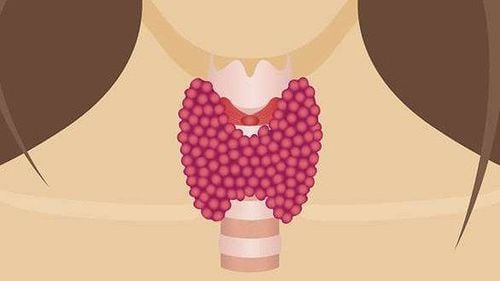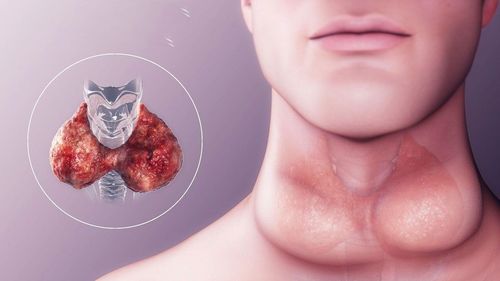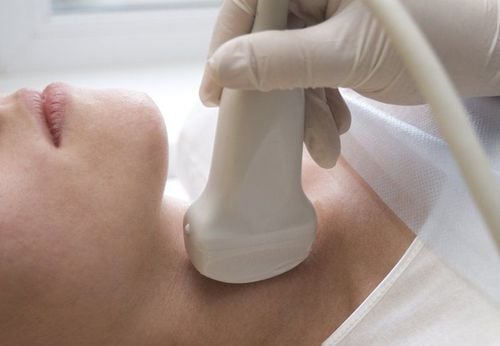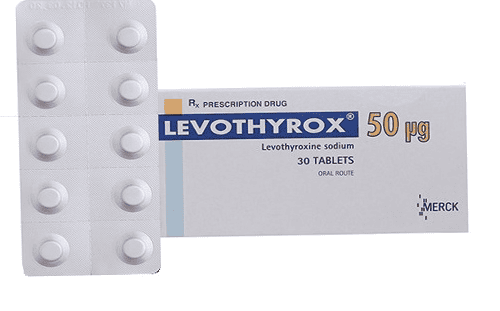This is an automatically translated article.
The article is professionally consulted by Master, Doctor Nguyen Thi Ngoc - General Internal Medicine - Endocrinology - Department of Examination & Internal Medicine - Vinmec Central Park International General Hospital.
Thyroid function test specifically shows some important parameters of the thyroid gland such as TSH, total T4, FT3, TSI. These indicators help doctors diagnose and provide appropriate treatment for thyroid disease.
1. Function of the thyroid gland
The thyroid is a small butterfly-shaped gland located in the front of the neck. The thyroid gland is responsible for producing hormones that regulate the activities of cells and organ tissues in the body. The body's metabolic rate and blood levels of certain minerals are closely related to thyroid hormone activity. The hormones thyroxine (T4) and triiodothyronine (T3) are two of the three hormones produced by the thyroid gland and released into the bloodstream. These two hormones are responsible for speeding up the body's metabolism. The other hormone is responsible for controlling calcium levels in the blood.The hypothalamus and pituitary gland of the brain produce hormones that control the activity of the thyroid gland. The hypothalamus receives signals about the state of functions in the body. When the hypothalamus senses low T3 and T4 levels or the body's metabolic rate is low, it releases thyrotropin-releasing hormone (TRH). TRH travels to the pituitary gland via the vascular system, stimulating the pituitary gland to secrete thyroid-stimulating hormone (TSH).
TSH is produced from the pituitary gland into the bloodstream, going to the thyroid gland. In the thyroid gland, TSH stimulates thyroid cells to produce more T3 and T4. Then, T3 and T4 will be released into the blood, which increases the metabolic activity of cells in the body.

Chức năng của tuyến giáp là sản xuất hormone điều hòa hoạt động của các tế bào và các mô cơ quan trong cơ thể
2. Purpose of thyroid function test
2.1 Thyroid function blood tests:
Triiodothyronine (T3): An active form of thyroid hormone, made from T4. The total T3 test measures the amount of Triiodothyronine circulating in the blood (both protein bound and nonprotein bound T3); Thyroxine (T4): The total T4 test helps measure the total amount of thyroxine in the blood, measuring thyroid function. In cases where a new problem is suspected, a T4 test will be done along with a TSH test; Thyroid-stimulating hormone (TSH): A pituitary hormone that sends signals to the thyroid gland; Thyroid peroxidase antibody (TPOAb): An antibody produced by the body that inadvertently attacks and destroys healthy thyroid tissue. The presence of this antibody indicates that the patient has an autoimmune thyroid disease such as Hashimoto's or Grave's (Basedow's) thyroiditis. This test is also indicated for women who are pregnant and have autoimmune disease, especially autoimmune thyroid disease such as Hashimoto or Grave. Some individuals with elevated TPOAb without thyroid disease may be at increased risk for future thyroid disease, so periodic thyroid monitoring is recommended to avoid missing future thyroid disease. The TRAb antibody contains TSI (Thyroid Stimulating Immune Globulin) which is an antibody that stimulates the thyroid gland to overactive and overproduces thyroid hormone into the bloodstream. Indications TRAb test: Diagnosis of Grave's disease Differential diagnosis of Grave's disease from other thyroid diseases with hyperthyroidism Follow-up treatment Grave Women in the last 3 months of pregnancy with a history of thyroid disease to predict risk Thyroglobulin (Tg) is a protein produced by the thyroid gland. This test is valuable in patients with papillary and follicular thyroid cancer to detect whether the cancer cells are still producing Tg compared to before cancer treatment; determine the outcome of cancer treatment and detect the possibility of cancer recurrence after treatment. In addition, Tg is also indicated to help determine the cause of hyperthyroidism and monitor the effectiveness of treatment for diseases such as Graves' disease. Tg also helps in the differential diagnosis of subacute thyroiditis from drug-induced thyrotoxicosis and to identify the cause of congenital hypothyroidism in children. Thyroglobulin Antibody (TgAb): An antibody produced by the body in response to the presence of Thyroglobulin. Excessive thyroglobulin production is abnormal. Therefore, TgAb production is considered the body's choice of defense against the progression of thyroid disease. TgAb helps diagnose autoimmune thyroid diseases such as Hashimoto's, postpartum thyroiditis, congenital hypothyroidism, and Grave's.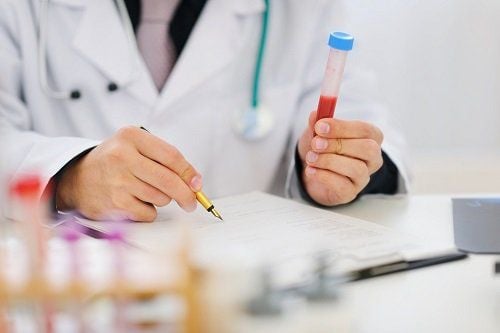
Kiểm tra các chỉ số của tuyến giáp thông qua việc xét nghiệm máu
2.2 Purpose of testing
Thyroid and pituitary are two organs that affect thyroid function. The pituitary gland is a gland that produces thyroid-stimulating hormone called TSH. When the pituitary gland detects that there is less thyroid hormone in the blood, it produces more TSH to prompt the thyroid gland to produce more thyroid hormone. If the pituitary gland detects that there is too much thyroid hormone in the blood, it will reduce the production of TSH to reduce the production of thyroid hormone.The production of TSH regulates the amount of T3 and T4 hormones. TSH, T3, and T4 readings can show how well the thyroid is working and what might be affecting its functioning.
Performing a thyroid function test helps doctors to identify a patient with hypothyroidism (decreased thyroid function), hyperthyroidism (increased thyroid function) and some thyroid abnormalities such as thyroiditis, or an autoimmune disease like Grave's or Hashimoto's thyroiditis.
3. Thyroid function test results
When performing thyroid function tests, you can be completely assured of your thyroid health, if your thyroid function test results are within the following limits:TSH index: 0.4- 4.0 mU/L; T4 index: 60-140 nmol/L; FT4: 10-26 pmol/L; T3 index: 1.1-2.7 nmol/L; FT3 index: 3.5-7.8 pmol/L.
4. Clinical significance of test indicators
Primary hypothyroidism due to thyroid disease such as Hashimoto's thyroiditis when TSH is high and FT4 is low; Hypothyroidism secondary to disease involving the pituitary gland or in response to a non-thyroid disease when TSH is low and FT4 is low; People with hyperthyroidism such as Graves' disease (Basedow) have low TSH with elevated FT4; Hypothyroidism is asymptomatic if the TSH level is slightly elevated but the FT4 level remains within the normal reference range; If initial thyroid test results suggest thyroid dysfunction, or autoimmune thyroid disease is suspected, one or more thyroid autoantibody tests such as TPOAb may be ordered. , TgAb and TRAb. When there are health problems such as unexplained rapid weight loss, sweating, fast heartbeat, fatigue, eye irritation, frequent bowel movements or diarrhea, ... or symptoms related to hyperthyroidism. At this time, the patient needs to go to the hospital for the doctor to examine, diagnose, test to evaluate thyroid function.
The Endocrinology Department of Vinmec International General Hospital is a gathering place of experienced medical doctors, solid expertise and always devoted to patient's health. At the same time, the hospital is also equipped with a system of modern medical equipment, comfortable facilities, the best support for the diagnosis and treatment of diseases.
Master, Doctor Nguyen Thi Ngoc has more than 10 years of studying, researching and working in the field of endocrinology. Doctor Ngoc graduated with a Master's degree in General Internal Medicine from Hanoi Medical University and studied as a Resident Doctor at the University of Lyon (France). Currently, Dr. Ngoc is a treating doctor at the Department of Examination and Internal Medicine, Vinmec Central Park International General Hospital.
Please dial HOTLINE for more information or register for an appointment HERE. Download MyVinmec app to make appointments faster and to manage your bookings easily.





